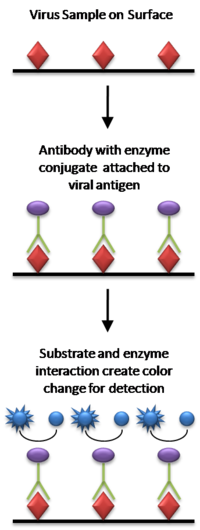
Whether or not you've ever heard of an ELISA test, chances are you've crossed paths with one in your lifetime. Technically, the name stands for "enzyme-linked immunosorbent assay". In english that means it's a wet lab test where a wet lab sample (often blood or urine) are attached to a surface. An antibody for the substance is added and after it links to the enzyme a substrate is added and the test gives you a result - usually by changing colors. This basic process is laid out on the right.
What is it used for?
ELISA tests have a tremendous number of uses. They can be used as a screening for cancer, pregnancy tests, bacterial diseases, autoimmune diseases like HIV, as well as drug testing and steroid testing. If you've ever had to take a urine drug test for a job it's quite likely you've taken an ELISA test.
Outside of your direct personal health, ELISA kits are also used to detect the presence of allergens. These can be used in restaurants or other facilities where contamination with certain allergens like nuts can prove fatal for potential customers.
Accuracy is definitely important
Just reading through the preceding paragraphs you'll notice that many of the uses of ELISA tests are of vital importance. Whether it's passing a drug test to get a new position or making sure someone with a severe nut allergy doesn't die when they open a package of cookies, ELISA tests better work. While there isn't a tremendous amount of across the board research, most publications do recommend for things such as HIV diagnosis that there are at least three positive tests done with an ELISA test to confirm an HIV diagnosis. Simply googling results for ELISA test accuracy will show you a tremendous amount of results on highly specific testing and their specificity. Often times you will see numbers above 90%, but rarely anywhere near a six sigma number.
Why is this important? Because whether you're going in for a diagnosis or a drug test, there's the possibility of false positives and false negatives. If you are told you fail a drug test and know the type of test being performed, you can rightfully request a new test. Knowledge in this case is definitely power.